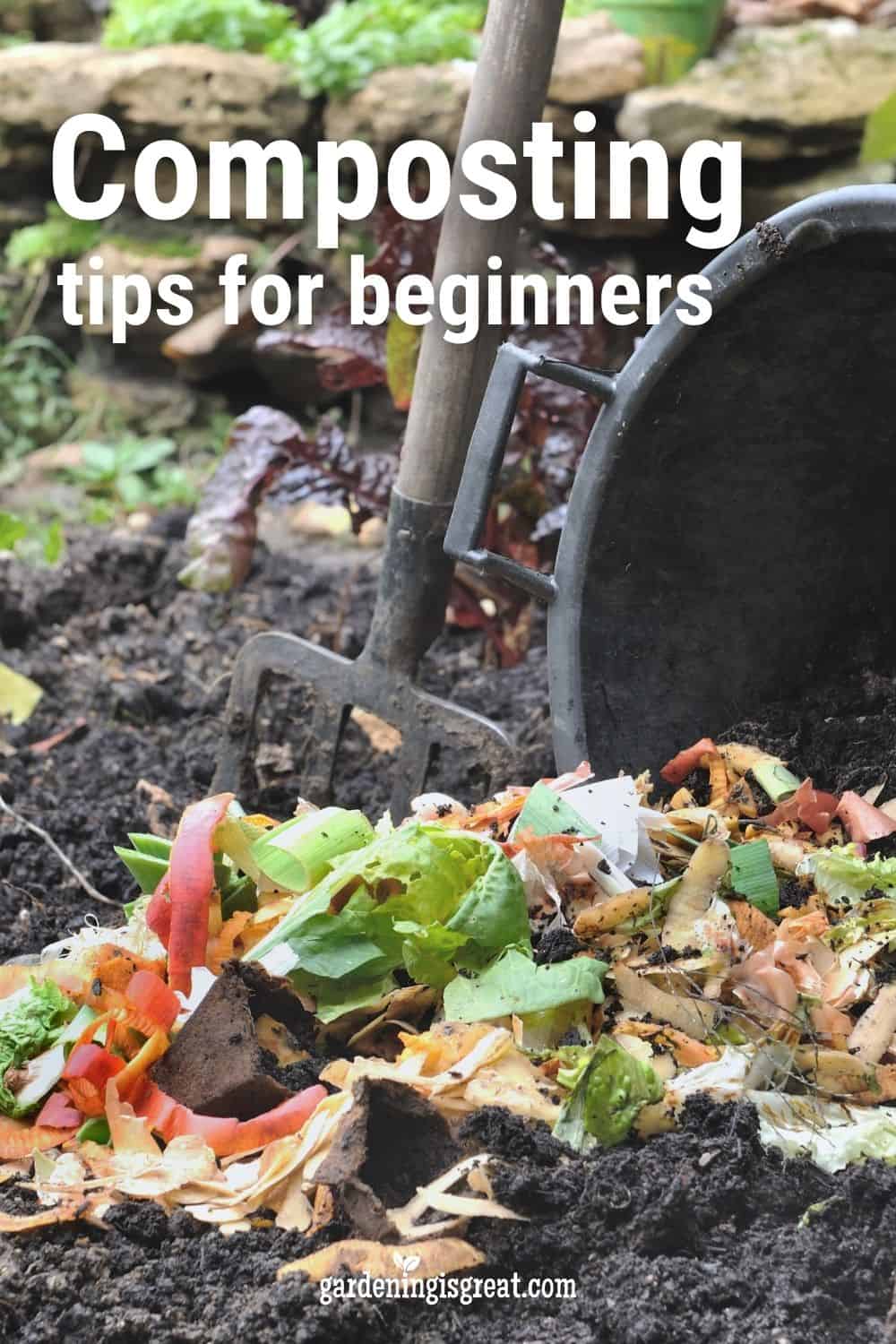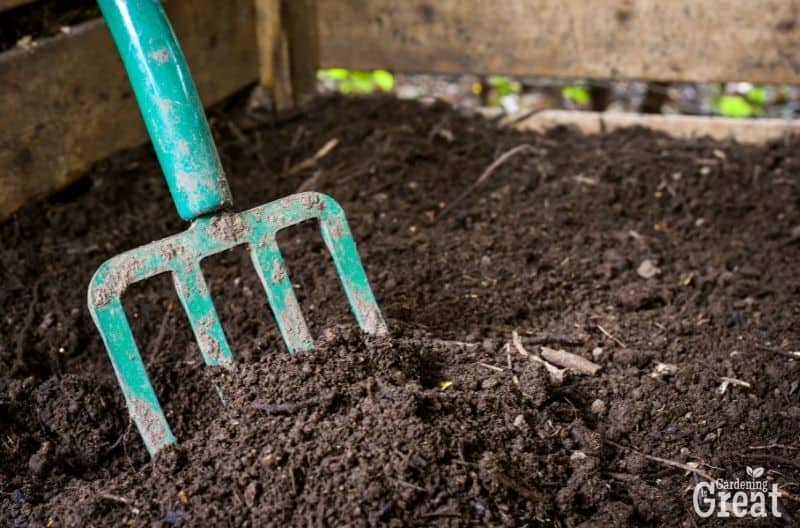5 Composting Tips for Beginners
If you are new to gardening you may be looking to find composting tips for beginners. Creating your own compost has numerous benefits not just for your own plants but also for the environment.
In this post, you will find 5 composting tips for beginners along with top reasons to compost at home.

What is Compost?
Compost is made of organic material which is decomposed and added to soil to help plants grow. Most households will recycle use leaves, meal leftovers, and food scraps such as peel to create compost.
Once items within your compost have broken down and decomposed, it is rich in nutrients and can be used in your garden.
Why Should You Compost?
Composting at home has numerous benefits not only to your own garden plants but to the environment as well.
Chemicals
By creating your own compost, you are able to support your plants’ health, helping them to grow naturally without the use of chemical fertilizers. Chemical fertilizers have a negative impact on the environment and pollinators such as bees and butterflies.
By composting, you are ensuring a safe environment for pollinators to do their job, helping to pollinate your plants, and supporting their health.
Soil Health
Soil health differs considerably around the world with some soil being clay-based, sandy, or even chalky. A lot of new home builds also have leftover rubble, rocks, and bricks that have been buried within the soil in your garden.
By creating your own compost and adding this to your soil, you are helping to improve the overall health of that soil.

Healthy soil is a key component to growing healthy plants. Plants need stable roots to grow strong and gain lots of nutrients from the soil around them. Adding your own natural compost to your soil, aids this process.
Landfill Waste
Did you know that food waste accounts for around 40% of the landfill produced in the UK alone?!
But, once this is placed in your plastic bags and buried in the ground, your food cannot decompose. Food needs oxygen in order to break down into compost. Without this, food ends up rotting and in the process produces methane.
Methane is a greenhouse gas that is even more dangerous than carbon dioxide. It has a negative impact on the environment and contributes to the current global warming crisis.
By taking your food waste out of your bin and recycling it into compost, you are helping to protect the environment and reduce the amount of methane gas produced through landfill.
Plant Protection
When you add compost to your soil, you are providing natural nutrients. This has been suggested to enhance plants in protecting themselves from diseases.
Plus, once your plants are ready to be harvested, they have an improved level of nutritional value in comparison to plants that are not grown in compost.
How Do You Start To Compost?
So we now know how important it is to recycle our food waste and create our own compost at home. But how do we start compost?
Compost needs three core ingredients in order to start:
- Dead leaves, branches, and twigs – these provide carbon
- Grass, vegetable, and fruit waste – these create nitrogen
- Water – moisture
Good compost has equal layers of numbers 1 and 2, with water to help break them down.
Start by adding the dead leaves, branches, and twigs. Then add a layer of water, followed by a layer of grass, vegetables, and fruit waste. Top with water and continue alternating each layer.
If you are using a container, ensure to prepare your container first by adding holes in the bottom for ventilation.
Compost can take anywhere from 3 months to a year. When it is ready, it will look a dark brown color, feel crumbly, and resemble rich soil.
5 Composting Tips for Beginners
Are you ready to make your own compost at home? Before you begin, take a look at these top composting tips to help beginners create high-quality compost at home:
1. Choose Where to Compost
You can either create compost inside in a compost bin or outside in a bin or pile. If choosing to compost inside, ensure your bin has ventilation with holes in the bottom and a tray to catch excess water.
Your indoor bin should have a lid to minimize any smells, pests, or rodents.
If choosing to compost outside, select a spot that is shady. Add your materials in the layers discussed above and keep moist. If possible, cover your compost to help it retain its moisture.
2. Managing Compost
Consider how much time you have to manage your compost. Cold compost options such as a pile outside are best for very busy people. It requires minimal management and tends to compost itself over time. However, with minimal input, it does take a lot longer for the material to decompose.
If you have more time to manage your compost, your waste could decompose in 4 weeks. This requires a higher temperature for your compost and a lot more management. For faster compost, ensure to select a warmer place in the sun to heat up the compost. If choosing a bin, a larger bin is better to produce heat and decompose items faster.
When adding items to your hot compost, ensure to cut items down into smaller pieces to help them break down easier. To maintain this type of compost, ensure it stays between 130-140 degrees. When it starts to cool down, turn your compost to help it retain its heat.
3. Moisture
Moisture is an essential ingredient in creating your compost and helping it to decompose.
But ensuring the right amount of moisture is essential. Too little moisture and the microbes growing to break down your waste diminish. Too much liquid and too many microbes are produced leading to a bad odor and the decomposing process will also stop.
Your compost should feel like a damp sponge. If you find there isn’t enough water, add some with a watering can to disperse evenly. If your compost is too wet, add dried twigs, leaves, newspaper to help soak up the excess liquid and turn your compost.
4. Equal Amounts of Green and Brown
As mentioned above, good compost requires carbon, nitrogen, and water. Carbon is gained from brown items such as dead leaves, plants, and weeds. Nitrogen is gained from your food waste such as fruit and vegetable leftovers.
It is important that equal amounts are added so that your compost can decompose. Carbon provides energy for microorganisms so they can break down your organic materials.
5. Regularly Turning
Air is the final component of good compost. Air is important otherwise your compost becomes slimy. By regularly airing your compost, you are helping to reduce high moisture content.
To air your compost, ensure to turn it regularly. If your compost has a high amount of moisture, it is a good idea to turn it every couple of days. Whereas if your compost does not have much water, add water and then turn about once a week.

Producing your own compost can be highly rewarding. It can take time and a balance of materials, but with patience and consistency, you can create high-quality, organic compost which will help your plants to grow stronger and benefit your soil.
After more on composting? Check out these next:
